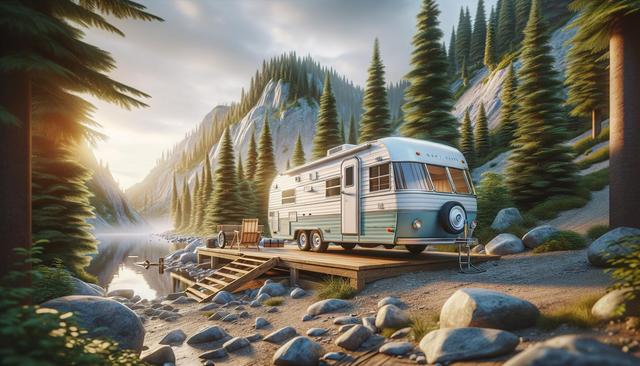Understanding the Benefits of Buying Used
Choosing a used travel trailer over a brand-new one can be a practical decision for many outdoor enthusiasts. The most significant advantage is cost savings. New travel trailers can depreciate quickly—often losing a notable portion of their value in the first few years. By opting for a used model, you avoid this initial depreciation and get more value for your money. It’s also easier to find models that have already been tested and reviewed by other owners, giving you insight into performance, reliability, and maintenance needs.
Another benefit is the wide variety of options available in the used market. Whether you’re looking for a compact trailer for weekend getaways or something larger to accommodate the whole family, you’re likely to find something that suits your needs. Many used trailers come with upgraded features or customizations made by previous owners, which can be a bonus if they align with your preferences.
Where to Look for Used Travel Trailers
Finding the right used travel trailer starts with knowing where to search. There are several reliable sources, both online and offline, where you can begin your hunt:
- Online classifieds and marketplaces
- RV-specific online platforms
- Local dealerships that offer trade-ins
- RV shows and expos with used inventory
- Word of mouth through RV communities and clubs
When browsing online, make sure to filter by location, price, and trailer type to narrow down the choices. Pay close attention to the listing details and photos, and never hesitate to ask sellers for additional information or more pictures. Local dealerships sometimes have certified pre-owned trailers that come with limited warranties, which can offer more peace of mind than a private sale.
Inspecting a Used Travel Trailer Before Purchase
Before committing to a purchase, it’s crucial to thoroughly inspect the travel trailer to avoid unexpected repair costs. Bring along a checklist or even a knowledgeable friend or mechanic if you’re unfamiliar with RV components. Key areas to inspect include:
- Exterior: Check for water damage, rust, or dents
- Roof: Look for cracks or signs of leaking
- Interior: Assess the condition of walls, flooring, and furniture
- Plumbing and Electrical: Test all systems to ensure they function properly
- Appliances: Make sure items like the fridge, stove, and furnace work
It’s also wise to request maintenance records from the seller if available. These can provide insights into how well the trailer was cared for and whether any major repairs have already been completed.
Budgeting and Negotiating Smartly
Sticking to a budget is essential when shopping for a used travel trailer, but that doesn’t mean you have to compromise on quality. Start by determining how much you’re willing to spend, including potential repairs or upgrades. Once you have a shortlist of trailers, compare their prices with similar models to understand the going rate.
Negotiation is a normal part of the buying process. Be respectful but firm when discussing the price, especially if you’ve identified issues during the inspection. Pointing out these issues can often lead to a reduced price or the seller agreeing to fix them before the sale. Don’t be afraid to walk away if the deal doesn’t feel right—there are plenty of options out there.
Also, consider financing if you find a trailer that slightly exceeds your budget but is in excellent condition. Some dealers offer financing options for used trailers, or you can explore personal loans through your bank or credit union.
Planning for Ownership Costs
Owning a travel trailer involves more than just the upfront purchase cost. It’s important to factor in ongoing expenses to avoid surprises later. Common ownership costs include:
- Insurance premiums
- Registration and taxes
- Maintenance and repairs
- Storage fees (if you can’t park it at home)
- Campground or RV park fees
Creating a budget that includes these recurring costs will help ensure that your travel trailer remains an enjoyable and stress-free investment. Additionally, consider setting aside a small emergency fund for unexpected repairs. Regular maintenance, such as checking for leaks and winterizing your trailer, can go a long way in preserving its condition and resale value.
Lastly, joining a local or online RV community can provide ongoing support, tips, and resources that can help you manage ownership more efficiently and economically.







